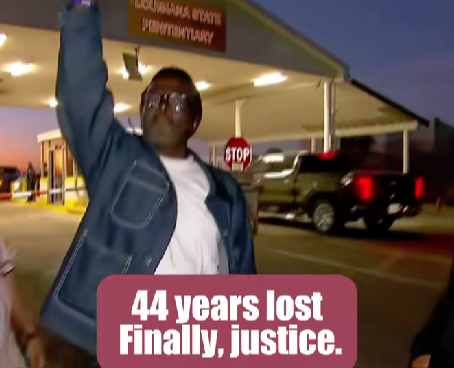After spending 44 years behind bars for a crime he didn’t commit, a Louisiana man has finally walked free — raising his fist in triumph as he stepped out of prison into the setting sun. His story, one of unimaginable endurance and hope, has become a powerful symbol of both injustice and redemption.
The man, now in his late 60s, was convicted in the late 1970s for a robbery and fatal shooting he had always insisted he didn’t commit. With no physical evidence tying him to the scene, his conviction rested on the shaky testimony of a single eyewitness — a common flaw in many wrongful conviction cases from that era.
For decades, he maintained his innocence, filing appeal after appeal. But it wasn’t until a team of attorneys from the Innocence Project took up his case that real progress began. Through a painstaking review of evidence and advances in forensic science, the team uncovered inconsistencies in the original trial and new information that ultimately proved his innocence.
In court this week, a judge formally vacated his conviction, apologizing for the miscarriage of justice. The moment the words “you are free to go” were spoken, gasps filled the courtroom. Supporters cried, hugged, and applauded as the man broke down in tears. Outside the courthouse, he said softly, “They took my youth, my family, my life — but they didn’t take my spirit.”
Upon leaving the Louisiana State Penitentiary, he was greeted by friends, family, and advocates who had fought for his release. The image of him raising his fist — equal parts relief and defiance — quickly spread online, where thousands shared messages of support and outrage. “Forty-four years,” one user wrote. “That’s longer than some people have been alive. Imagine waking up every day knowing you’re innocent and no one believes you.”
Legal experts say his release highlights ongoing flaws in the justice system, particularly around outdated forensic practices, racial bias, and overreliance on eyewitness testimony. “Cases like this are not rare — they’re reminders of how easily justice can fail,” said a criminal law professor. “It’s not just about freeing one man. It’s about fixing a system that allows this to happen.”
The state has confirmed that he will be eligible for compensation under Louisiana’s wrongful imprisonment statute, though the exact amount remains to be determined. Advocates argue that no amount of money can restore what he’s lost — missed birthdays, funerals, and nearly half a century of freedom.
Despite the years stolen from him, he says he holds no hatred in his heart. “I can’t get those years back,” he told reporters. “But I can use what’s left of my life to make sure this doesn’t happen to someone else.”
His first request after walking free? A meal with his family and a quiet night under the open sky — something he hadn’t experienced in over four decades.
Forty-four years of pain ended with one word: freedom. And for the first time in nearly half a century, justice was finally served.
